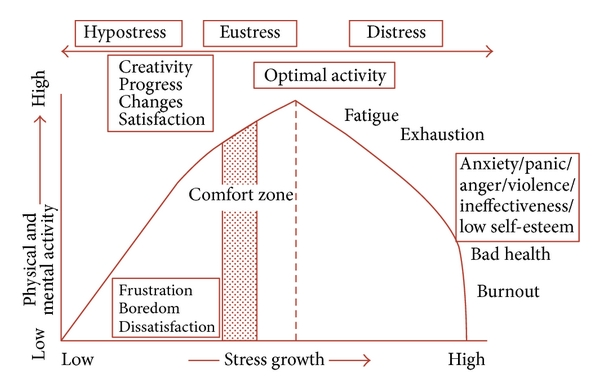Stress has always been seen as commonplace in the customer service sector with smallbizgenius.net stating that 83% of US workers suffer from work-related stress. Dealing with customers on a daily basis can take a toll on a support agent at one stage or another in their career. Regardless of which support channel the customer is contacting through, the agent has to remain calm and collected while also working towards their target service level and responding in a timely and courteous manner. Given that the targets for an agent will generally push them to spend as little time on a ticket as possible while providing a high level of customer satisfaction, high-volume customer care teams generally carry a lot of stress.
In this post, we will break down what stress is, and provide some mitigating measures to help alleviate it.
What is stress exactly?
According to mentalhealth.org.uk stress “can be defined as the degree to which you feel overwhelmed or unable to cope as a result of pressures that are unmanageable”.
Stress can be described as a completely logical reaction to an event or blocker that you have found yourself faced with. Stress can be broken down into two basic-level parts - positive stress and negative stress.
Positive stress, also known as eustress, provides the will and motivation to continue when faced with a challenge that one is capable of succeeding in. Think of working on a project that will help the chance for a promotion, or taking part in the final of a competition. You have the skill-set and ability to succeed, eustress is the encouraging anxious feeling behind your motivation.
Negative stress, which can be broken down further, is the most popular of the two. Negative stress appears when overwhelmed by projects and tasks that block out success and happiness. It can cause numerous knock-on effects including anxiety, depression, fatigue, sleep and eating disorders, and unhappiness. KornFerry has stated that in 2018, 76% of US workers said that workplace stress affected their personal relationships, and 66% said that stress caused sleep deprivation.
There are a number of knock-on effects to an agent who is experiencing stress on the job. These effects both have a negative effect on the agent as an employee and on the company’s overall brand. Let’s have a look through them one by one and suggest some solutions.
Stress on the job can cause a decrease in performance. This means that the level of service that is expected by both the company and by the customer is not available, and while the agent is still completing their tasks, the work can become sloppy and lower team’s level of customer service. The Stress Response Curve, as seen below(Nixon P. 1979), shows that a person’s performance under stress changes dramatically when the positive stress changes to negative stress and knock-on effects become apparent.

Job satisfaction has become a much talked about trend in recent years with many employees speaking out about a lack of job satisfaction in their workplace. Stress is one facet of this and can definitely create an unhappy working environment for a support agent. Gallup reported that engaged teams generate 21% more profit than their less satisfied and engaged counterparts.
Efficiency should be the main target in contact centres but unfortunately, this is sometimes looked over as the nature of the department can become too busy. A significant amount of stress can really create inefficient processes for the agent. The team over at Co-worker.com look at the signs of inefficiency that eventually lead up to an employee burning out.
Stress can add to an employee’s own personal stresses. Bad overall health, be it mental or physical, can increase the risk of absenteeism and employee turnover. In a study by Korn Ferry 16% of workers have quit their job due to stress.
In a world where the customer wants the best experience available, stress can impact customer satisfaction in a huge way. State of the American Workplace survey by Gallup stated that 51% of US workers have “checked-out” at work. This sort of outlook and performance issue would have a direct effect on customer’s satisfaction levels during a support interaction.
What steps can a company take to ensure a less stressful environment in the long-term?
Rather than approach stress with a short-term solution where an employee might be given time off or a decreased work-load in order to regain a previous stable performance, managers and customer service departments can choose to invest in a long-term strategy.
Large companies like Facebook and Google have invested in their support staff that deal with stress through content moderation roles. It is widely known that these agents undergo a lot of stress given the nature of their jobs and so are entitled to medical insurance, paid-leave and mental health outlets as part of their contract.
For a customer support agent who is bombarded on a daily basis by the high volume of queries, there are a number of ways in which a company can help reduce the stress.
Teams should have more regular 1-to-1 sessions with agents in order to understand the stress and see what can be done going forward. If points are brought up across the team then it might be time for a change in strategy.
Wellness programmes, training and workplace seminars can be adapted into a company’s culture so that the agents can learn how to deal with stress on a personal level.
KPIs and expectations that are set out by the organisation should be made more transparent and attainable with the right training and planning. This will improve efficiency and productivity in the workplace.
Processes and technology that agents use on a daily basis may-be outdated causing unnecessary work for agents that find it hard to complete their main tasks. Automation and new tools have been built in order to help with this aspect of agent stress.
Companies can set out to empower employees in the workplace rather than make them feel under pressure to achieve unrealistic expectations. Create transparency across teams and the department and this will have a knock-on effect to helping boost the esteem of the agents.
For more information on how to reduce agent stress while also increasing customer satisfaction and lowering AHT, drop us a message at info@edgetier.com










